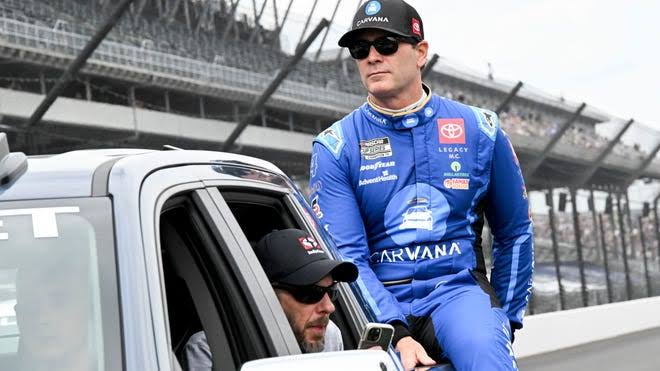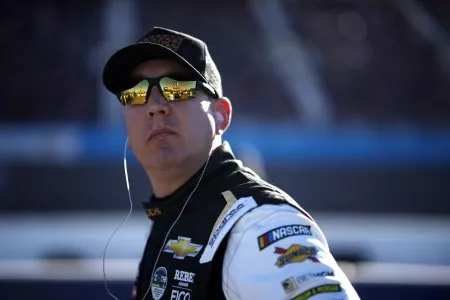NASCAR Admits ‘Changes’ Could Be Coming in the Xfinity and Truck Series
NASCAR, one of the most prominent motorsport organizations in North America, has seen significant changes over the past few seasons, from the introduction of the Next Gen car in the Cup Series to increasing efforts in enhancing the fan experience. Yet, while the Cup Series has experienced the most visible changes, NASCAR’s other sanctioned series—the Xfinity Series and the Craftsman Truck Series—also find themselves at a crossroads. Recently, NASCAR officials have publicly admitted that “changes” could be coming to these series, hinting at adjustments that may affect everything from the cars and competition formats to the marketing strategies and fan engagement.
In this article, we will explore the potential changes that NASCAR has acknowledged could be on the horizon for both the Xfinity Series and the Truck Series, as well as the reasons behind these possible shifts. We will examine the challenges and opportunities both series face, the possible impact of these changes on drivers, teams, and fans, and the broader implications for the future of NASCAR’s development pipeline.
—
The Current State of the Xfinity and Truck Series
To understand why changes are being considered, it’s essential to first take a look at the state of the Xfinity and Truck Series in their current form.
Xfinity Series: NASCAR’s Second Tier
The Xfinity Series is often regarded as the “minor league” to NASCAR’s Cup Series, though it has seen its own growth in terms of both viewership and competition. The series has always served as a proving ground for drivers hoping to make the jump to the Cup Series, with many of today’s top stars having honed their skills in Xfinity, including drivers like Kyle Larson, Chase Elliott, and Joey Logano.
However, the Xfinity Series has faced a few challenges in recent years:
1. Driver Attrition: While many Cup drivers participate in select Xfinity races, the series has seen an increasing reliance on veteran drivers, leaving fewer opportunities for younger talent to shine.
2. Sponsorship and Financial Support: The financial landscape for Xfinity teams can be precarious, especially with smaller teams struggling to secure the same level of sponsorships that the top teams enjoy.
3. Car Design and Competition: The Xfinity Series uses cars that are similar to the Cup Series’ vehicles but not identical. These cars have been seen by some as outdated in terms of both design and performance, contributing to concerns about the long-term competitiveness of the series.
Despite these issues, the Xfinity Series remains an integral part of NASCAR’s overall ecosystem. The series plays a vital role in developing the next generation of Cup Series drivers, and it continues to offer thrilling races. However, with the rise of other racing series, such as IndyCar and Formula 1, NASCAR faces increasing competition for fan attention and media exposure, which has sparked discussions about how to improve the Xfinity Series.
Craftsman Truck Series: The Gateway to NASCAR for Many
The NASCAR Craftsman Truck Series is another cornerstone of NASCAR’s ecosystem, providing young drivers and teams a way into the sport. This series is unique in that it offers the spectacle of truck racing, which adds an element of unpredictability and excitement to the NASCAR family. Over the years, it has attracted both up-and-coming drivers and seasoned veterans who are looking to continue their careers at a high level.
Much like the Xfinity Series, however, the Truck Series faces its own set of challenges:
1. Vehicle Performance and Consistency: The Truck Series utilizes a different vehicle platform compared to both the Cup and Xfinity Series, which has led to some issues with consistency and technological advancements. While the trucks are designed to be competitive, there has been criticism that some teams are better funded and able to develop superior equipment, leading to a lack of parity in performance.
2. Limited Nationwide Exposure: While the Xfinity Series is broadcasted on major television networks, the Truck Series often struggles with its media coverage and, consequently, its overall exposure to a national audience.
3. Team Stability and Growth: Like the Xfinity Series, many Truck Series teams face financial difficulties. The lack of funding often leads to instability, with teams entering and leaving the series frequently. This lack of consistency can hurt the series’ ability to establish a solid fan base and grow its influence.
These challenges have prompted NASCAR officials to consider how best to elevate both the Xfinity and Truck Series to ensure they remain competitive and relevant in the ever-evolving landscape of motorsport.
—
NASCAR Admits Changes Are on the Horizon
While NASCAR has not yet unveiled any specific details about the changes they’re considering for the Xfinity and Truck Series, several key figures have hinted that alterations could be imminent. In recent statements, NASCAR officials acknowledged the need for fresh approaches to address the challenges facing both series.
Possible Changes in the Xfinity Series
1. Car Design Overhaul: One of the most significant changes that could come to the Xfinity Series is the potential introduction of a new car design. NASCAR has been focused on modernizing the competition in the Cup Series with the Next Gen car, which is designed to be more durable, cost-effective, and adaptable. Some have speculated that the Xfinity Series could receive a similar overhaul. This would help the series stay relevant with current automotive and racing trends and may also give teams more flexibility in vehicle development.
2. Stronger Support for Developmental Drivers: NASCAR has repeatedly stressed the importance of the Xfinity Series as a breeding ground for talent. To address concerns about driver attrition and the series’ overall competitiveness, NASCAR may introduce more programs aimed at supporting younger, up-and-coming drivers. This could include an increased focus on development contracts, expanding opportunities for rookies, or providing more support for teams working with lesser-known drivers.
3. Revamping the Competition Format: The current competition format in the Xfinity Series involves several stages, much like the Cup Series. However, NASCAR may tweak this format further to enhance racing action and improve the fan experience. This could include revising stage lengths, adjusting playoff formats, or introducing new rules aimed at increasing competition. NASCAR has been careful to avoid drastic changes, but incremental tweaks could be made to increase excitement.
4. Increased Sponsorship and Financial Support: Another potential change for the Xfinity Series revolves around increased financial backing. NASCAR could work on securing higher-profile sponsors for the series, perhaps tying in more Cup Series sponsors to provide consistent funding for Xfinity teams. Increased sponsorship could help stabilize the teams financially and allow for greater investment in both cars and driver development.
Possible Changes in the Truck Series
1. Revamping the Vehicle Platform: Similar to the Xfinity Series, the Truck Series may undergo a review of its vehicle platform. The current truck designs are often considered outdated compared to the modern Cup and Xfinity cars. There’s a possibility that NASCAR will look into incorporating elements of the Next Gen car into the trucks, giving the series a more uniform and competitive edge across all three divisions. A redesign would also help to improve the safety features of the trucks, which has been an ongoing concern within the sport.
2. Increased Exposure and Media Coverage: The Truck Series struggles with limited media coverage compared to both the Cup and Xfinity Series. NASCAR has made moves to increase the visibility of the series, including improving streaming options and expanding broadcast coverage on major networks. In the future, NASCAR could strike more media deals to ensure that the Truck Series receives more consistent exposure, which is crucial for attracting new fans and sponsors.
3. Enhanced Team Stability: NASCAR has acknowledged that one of the Truck Series’ biggest obstacles is financial instability among teams. Teams often face financial hardships, and many fail to secure the long-term sponsorships needed to compete at a high level. NASCAR could work toward establishing a more sustainable business model for Truck Series teams, potentially introducing incentives for teams that demonstrate financial stability or offering a more structured and predictable revenue-sharing model.
4. Increased Focus on Short-Track Racing: The Truck Series is often lauded for its exciting short-track races, which tend to produce thrilling on-track battles and unique challenges for drivers. NASCAR might consider increasing the number of short-track races in the series, which would not only add to the excitement but also provide a valuable platform for developing driver skills. The Truck Series’ emphasis on short-track racing is one of the things that separates it from the Xfinity and Cup Series, and expanding this format could be beneficial.
—
Why Are These Changes Being Considered?
There are several factors driving NASCAR’s consideration of changes in both the Xfinity and Truck Series. These include the need to modernize the sport, attract new fans, ensure the continued growth of NASCAR as a whole, and address specific challenges faced by teams and drivers in these two important series.
1. Evolving Fan Preferences: NASCAR, like all sports, is competing for fan attention in a crowded entertainment market. With the rise of esports, streaming services, and a general shift in media consumption, NASCAR is aware that it must remain relevant and exciting to new generations of fans. This includes finding ways to make the Xfinity and Truck Series more appealing and ensuring the racing is engaging and competitive.
2. Driver Development: As the NASCAR Cup Series becomes more competitive, there is a growing demand for fresh talent. Both the Xfinity and Truck Series serve as essential developmental platforms for drivers who aim to make it to the top level. By enhancing these series, NASCAR ensures a pipeline of talent for the future and gives young drivers the tools and opportunities to succeed.
3. Financial Sustainability: The financial health of the Xfinity and Truck Series is critical to their long-term viability. NASCAR needs to ensure that these series are financially stable, attracting sponsorship, investment, and media exposure. By introducing changes that improve team competitiveness, reduce costs, and provide more visibility, NASCAR aims to strengthen the economic foundation





